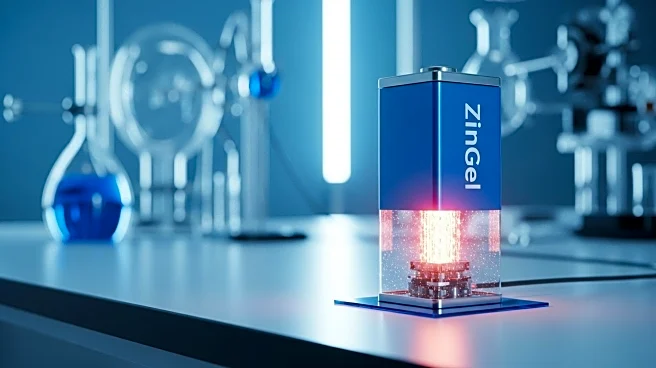What's Happening?
Offgrid Energy Labs, an Indian deep-tech startup, has successfully raised $15 million in Series A funding to further develop its ZincGel battery technology. This innovative system utilizes zinc-bromine as an alternative to the conventional lithium-ion batteries, aiming to alleviate supply chain constraints by using widely available materials. Founded in 2018 at IIT Kanpur, the company plans to demonstrate its technology at a UK facility by 2026 and expand with a gigafactory in India. The ZincGel battery system is designed for longer discharges and greater lifespan, attracting interest from industries focused on renewable energy and net-zero goals.
Why It's Important?
The development of ZincGel battery technology by Offgrid Energy Labs represents a significant advancement in the energy storage sector, particularly for industries committed to renewable energy and sustainability. By offering a cost-effective and efficient alternative to lithium-ion batteries, the startup addresses critical supply chain issues and supports global efforts to achieve net-zero emissions. This innovation could lead to increased adoption of renewable energy solutions, potentially reducing dependency on traditional energy sources and contributing to environmental conservation.
What's Next?
Offgrid Energy Labs plans to demonstrate its ZincGel technology at a UK facility by 2026, which could pave the way for broader adoption in international markets. The expansion with a gigafactory in India indicates a strategic move to scale production and meet growing demand. As industries continue to prioritize sustainability, the company may see increased interest and investment, potentially influencing energy storage standards and practices globally.
Beyond the Headlines
The introduction of ZincGel technology could have long-term implications for the energy sector, including shifts in supply chain dynamics and material sourcing. By utilizing zinc-bromine, Offgrid Energy Labs challenges the dominance of lithium-ion systems, potentially leading to more diverse and resilient energy storage solutions. This development also highlights the role of innovation in addressing environmental challenges and promoting sustainable practices.












